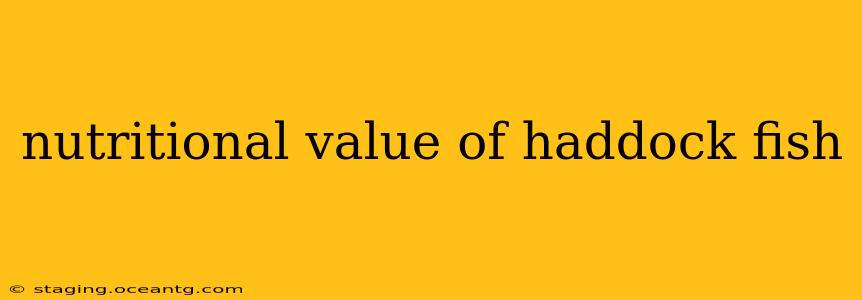Haddock, a flaky white fish belonging to the cod family, is a popular choice for its mild flavor and versatility. But beyond its delicious taste, haddock boasts an impressive nutritional profile packed with health benefits. This comprehensive guide delves into the nutritional value of haddock, exploring its macro and micronutrients, health advantages, and potential drawbacks.
What are the macronutrients in haddock?
Haddock is a lean protein source, low in fat and high in protein. A 3-ounce serving of cooked haddock typically contains approximately:
- Protein: Around 20 grams. Protein is essential for building and repairing tissues, making haddock an excellent choice for athletes and those focused on muscle growth and maintenance.
- Fat: Less than 2 grams, mostly unsaturated fats. Unsaturated fats are considered "good" fats, contributing to heart health. Haddock's low fat content makes it suitable for individuals watching their calorie intake.
- Carbohydrates: Negligible amounts. Haddock is naturally carbohydrate-free, making it a great option for low-carb diets like keto.
What are the micronutrients in haddock?
Beyond macronutrients, haddock is a treasure trove of essential micronutrients:
- Vitamin B12: Crucial for nerve function and red blood cell formation. Haddock is an excellent source, providing a significant percentage of the daily recommended value.
- Selenium: A powerful antioxidant that protects cells from damage.
- Niacin (Vitamin B3): Contributes to energy metabolism and DNA repair.
- Phosphorus: Essential for bone health and energy production.
- Potassium: Plays a vital role in maintaining fluid balance and blood pressure.
- Omega-3 fatty acids: Though present in smaller amounts than in some other fatty fish, haddock still offers beneficial omega-3s like EPA and DHA, known for their anti-inflammatory properties and heart health benefits.
Is haddock good for weight loss?
Yes, haddock can be a valuable component of a weight-loss diet. Its high protein content promotes satiety, helping you feel fuller for longer and reducing overall calorie intake. The low fat and carbohydrate content further contributes to its suitability for weight management.
Is haddock high in mercury?
No, haddock is considered a low-mercury fish. This makes it a safe and healthy choice for regular consumption, especially for pregnant women and young children who are more vulnerable to the effects of mercury. However, moderation is always key when incorporating any seafood into your diet.
What are the health benefits of eating haddock?
The nutritional profile of haddock translates into numerous health benefits:
- Improved heart health: The combination of omega-3 fatty acids, low saturated fat, and high protein supports cardiovascular health.
- Stronger bones: The phosphorus content contributes to bone strength and density.
- Enhanced brain function: Vitamin B12 is crucial for brain health and cognitive function.
- Improved muscle growth and repair: High-quality protein aids muscle development and recovery.
- Boosted immune system: Selenium acts as an antioxidant, strengthening the immune system.
How can I prepare haddock?
Haddock is exceptionally versatile and can be prepared in various ways: baking, grilling, pan-frying, poaching, or even added to soups and stews. Its mild flavor allows it to absorb other flavors beautifully, making it an excellent canvas for culinary creativity.
What are some potential downsides of eating haddock?
While generally safe and healthy, potential downsides include:
- Allergies: Some individuals might be allergic to haddock or other fish.
- Contaminants: Although haddock is low in mercury, there’s a small chance of other contaminants depending on where it's sourced and how it's handled. Choose sustainably sourced haddock whenever possible.
- Purines: Haddock contains purines, which can be problematic for individuals with gout. Moderation is advised.
Conclusion
Haddock is a nutritious and delicious fish that offers a wealth of health benefits. Its high protein content, low fat, and rich supply of essential vitamins and minerals make it a valuable addition to a balanced diet. Remember to always choose sustainably sourced haddock and incorporate it into your meal plan in moderation as part of a healthy, varied diet.
